Abstract
In the last five years, SMEs need competes not only in the domestic market but also in the international market. There are various ways to build the competitiveness of a business sector. One of them is to pay attention to the efficiency of business processes in SMEs. In order to assess the efficiency of a business unit, waste becomes one of the indicators that need to be minimized because waste can occur anywhere and anytime in a business unit and impact on its profitability. One of the concepts to reduce waste is by implementing the lean concept. The lean concept aims to reduce waste in an organization. One of waste in the concept of lean is the waste of knowledge. Before improving the efficiency of knowledge management, SMEs should measure the factors that support lean implementation. Therefore, this case study was aimed to measure the supporting factors in the implementation of knowledge management in SMEs, specifically in Malang Residency and Greater Malang, East Java, Indonesia. To collect the data this research used observation, survey through questionnaire and interview. The results of this study indicated that more than 50% of SMEs had insufficient performance on the 11 factors that support the implementation of knowledge management.
Keywords: Knowledge managementlean logisticssmall and medium enterprisesmeasurement
Introduction
Since the ASEAN Economic Community (AEC) Era was established, ASEAN countries have prepared for a free trade among ASEAN countries as a consequence of ASEAN economic integration. Indonesia as one of the countries in that region needs compete in various business sectors. Business competition occurs not only in the international market but also in the domestic market. It has impacts on not only large industries but also SMEs.
The number of SMEs in Indonesia has increased year by year. By considering the increasing number of SMEs and Indonesia's current economic condition, SMEs encounter the high level of competition. There are various ways to build the competitiveness of a business sector. One of them is through developing the efficiency of business processes. In order to assess the efficiency of a business unit, waste is one of the indicators that should be considered. Waste is everything that has no added value to the product or service produced by a company (Hines & Taylor, 2000).
Most of SMEs in Indonesia are not yet conscious on minimizing waste in a business management. One of the efforts to reduce waste is through implementing lean concepts. The lean concept is a set of methods designed to eliminate waste, reduce waiting times, improve performance and reduce costs (Levinson, 2013). The concept of lean was first introduced by the Toyota Production System. The goal of lean is to eliminate waste in all processes and maximize process efficiency (Yang, Chen, & Wang, 2012). In the lean method, all steps and activities that add value will be retained and activities that do not add value will be eliminated (Poppendieck, 2002). Logistics experts classify waste into seven classifications known as seven wastes, which consist of the waste of inventory; waste of transportation; waste of space and facilities; waste of time; waste of packaging; waste of administration and waste of knowledge.
Waste of administration and knowledge is related to the governance of a business organization including labour and customer satisfaction. For the current era, the need of labour is no longer based on quantity, but more on quality. It is known by the term of knowledge workers. Knowledge workers are expected to add value to the productivity of a business unit. The importance of knowledge workers is reflected by their role as the provider of knowledge and creator of value for the organization. Knowledge management can solve the organization problem through employee engagement and employee commitment. The collaboration, innovation, adaptation, technological expertise, market domination and intellectual assets management encourage the need for knowledge management (Clarke & Turner, 2004).
Problem Statement
In an organization, knowledge is stored not only in documents or specialized databases but also in organizational routines, processes, practices, and norms (Nonaka, 1994). Knowledge management is an organizational activity in the management of knowledge. Knowledge management has a role to distribute proper knowledge to the right people and in a fast time, so people can interact, share knowledge and apply it in daily work for the improvement of organizational performance. Knowledge Management can be seen as an approach to achieve company goals by focusing on knowledge (Bornemann & Sammer, 2003).
To ensure the successful implementation of knowledge management in SMEs, it is important to determine the critical success factors for implementation of knowledge management. Optimization of critical success factors creates effective utilization of limited organizational resources and reduces the use of labour, materials and time. Critical success factors determine performance for the organization.
The implementation of knowledge management in SMEs and large companies are different. SMEs have limitations in various aspects, such as human resources, technology, and educational factors. In addition, the problems that are often encountered by SMEs are the capital, marketing, and mastery of knowledge. Those factors are important to improve the competitiveness of SMEs.
Based on the previous background, there are several problems that must be faced by SMEs. With the purpose of penetration into an ASEAN-level competition, SMEs should ready to improve their business governance, one component of which is the readiness of their employees. The readiness refers to the improvement of knowledge of employees; utilization of human resources and also the advancement of employee ability to access information from internal and external parties. Prior to improving the efficiency of knowledge management in SMEs, SMEs should measure the factors that support lean implementation. Factually, studies measuring and analysing the supporting factors for knowledge management implementation in SMEs, especially in East Java Indonesia, have not yet sufficiently conducted.
Research Questions
This case study focuses on a research question associated with the need for supporting knowledge management in SMEs in East Java, especially in Malang Residency and Greater Malang. The research question of this study is “to what extent do SMEs in Malang Residency and Greater Malang implement the supporting factors for knowledge management?”
Purpose of the Study
Based on the research question, this study was aimed to measure the extent of the supporting factors for the implementation of knowledge management in SMEs, specifically for the case study in Malang Residency and Greater Malang, Areas in East Java Province, Indonesia.
Research Methods
This research was conducted in SMEs which engage in the field of the food industry in Malang Residency and Greater Malang, East Java Province, Indonesia. The sample used in this research was SMEs in the areas. The samples taken were 30 respondents from owners and 30 respondents from employees.
The research variables studied involved the supporting factors for the knowledge management implementation. The data used in this study were the primary data obtained from questionnaires and observations. The main data taken were ordinal data. It was taken through questionnaires distributed to respondents. Information identified consists of name, age, the role of respondent, name, and address of SMEs and factors influencing the implementation of knowledge management.
Before the questionnaire was used to collect data, validity and reliability tests were performed. The result of both tests shows that the questionnaire was valid and reliable. After questionnaire was testing, the next step was to perform data retrieval and data analysis. The analytical method used was descriptive analysis method. The results are presented in the form of graphs; therefore, more informative.
Findings
Wong (2005) and Migdadi (2009) expanded the previous study of Hasanali (2002) about critical success factors for knowledge management. They revealed that there are 11 critical success factors in the successful implementation of knowledge management in SMEs, namely management leadership and support; culture; information technology; strategy and purpose; measurement; organizational infrastructure; process and activities; motivational aids; resources; training and education; and human resource management. Those studies were used in this research. The following sections will present the measurement result of supporting factors for knowledge management implementation in SMEs.
Management of leadership and support
Management of leadership and support implies that leaders build the necessary conditions for effective knowledge management (Holsapple & Joshi, 2000). Support and commitment especially from their senior management are critical to knowledge management implementation (Sharp, 2003). Leaders are essential in acting as role models of the desired behaviour to support knowledge management. Leaders should demonstrate the willingness to share and offer their knowledge freely with people in the organization. They also should have learnt and sought new knowledge and ideas. Therefore, leadership and support management plays a key role in the success of knowledge management (Holsapple & Joshi, 2000).
In this study, leadership and support management variables consist of 7 items. Based on the results of data processing in figure
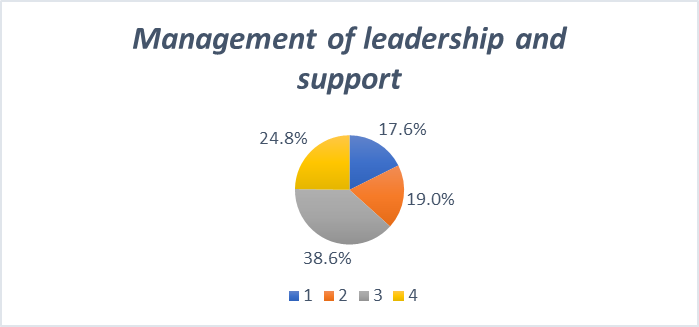
Culture
In this study, cultural variables consisted of 4 items. Based on the results of data processing as can be seen in figure
Organizational culture is the beliefs, values, and norms that govern the individual behave in an organization (Wong, 2005). Organizational culture is the key in the knowledge management for sharing knowledge (Holsapple & Joshi, 2000). Organizational culture provides the advantage of creating knowledge for the organization (Long, 1997). One of the most important cultural aspects for KM is collaboration. Goh (2002) argue that collaboration is a very important culture for knowledge transfer. Collaboration has empirically significantly contributed to knowledge development (Migdadi, 2009).
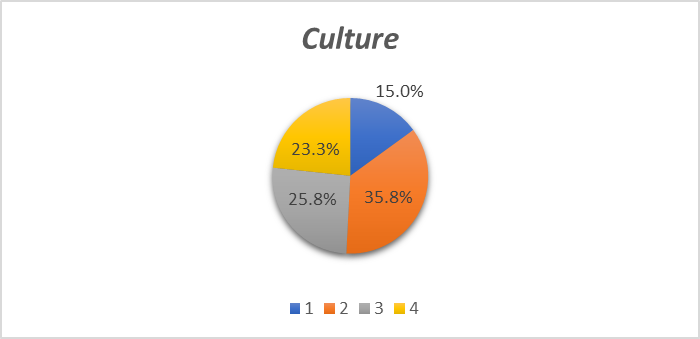
Information technology
Information technology is one of the keys to implement knowledge management. Information technology supports to access information, to collaborate and to communicate with members of the organization. It has various roles to support the organization's knowledge management process. In the development of knowledge management systems, information technology should consider several factors, such as the easiness, conformity, the needs of users, the relevance of knowledge content, and the standardization of knowledge structures (Alavi & Leidner, 2001).
In this study, the information technology variables consisted of 5 items. Based on the results of data processing, Figure
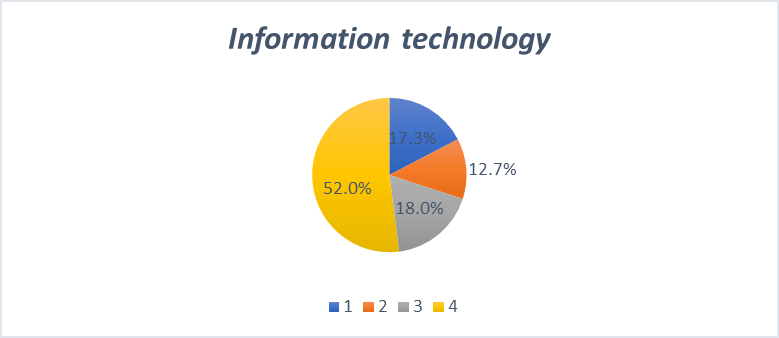
Strategy and purpose
Strategy and purpose variable was arranged by 14 items. The results of data analysis, as summarised in Figure
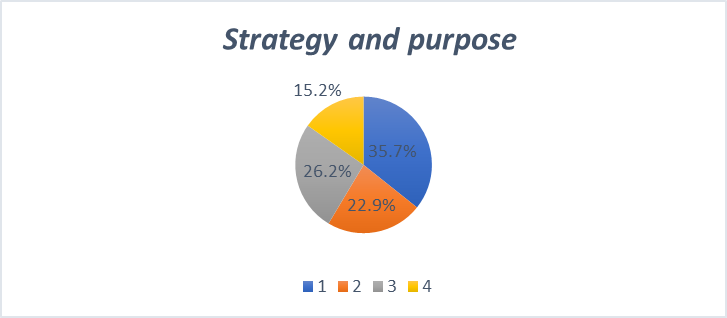
The knowledge management development strategy must be clear and planned (Liebowitz, 1999) and integrated with the company's business strategy (Maier & Remus, 2002). Knowledge management strategies should control how knowledge creates value for the organization. The strategy consists of a number of integrated projects. It should perform gradually over time and long-term profit orientation. The strategy should be able to identify the risks associated with the knowledge management program. Furthermore, it should identify the organization's needs and key issues in providing the framework for an organization.
Measurement
Measurements will identify and provide a valid assessment of the success factors of knowledge management implementation. According to Arora (2002), measurement of knowledge management level is needed to achieve goals of organizations. Organizations enable to track the progress of knowledge management and to determine its benefits and effectiveness through measurement. Grossman (2006) argued that knowledge management measurement can systematically improve the mapping, monitoring, and diffusion of intangible assets and critical knowledge within an organization.
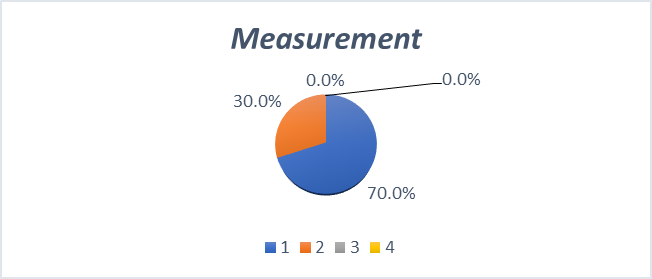
In this study, the measurement variable consists of 3 items. Based on the results of data analysis as shown in Figure
Organizational infrastructure
In the organizational infrastructure variable, there are 3 items. Based on the results of data analysis, it appears 44.4% of SMEs lack the good organizational infrastructure to support knowledge and skills development (Figure
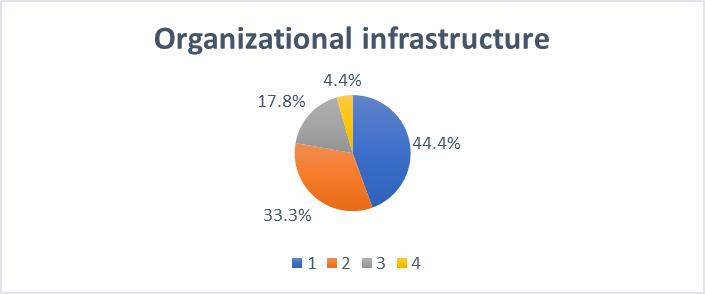
Developing the right organizational infrastructure is an important aspect of implementing knowledge management. These variables will be needed to plan, organize, coordinate and arrange details of knowledge management (Wong, 2005).
Process and activities
In this study, the variable process and activities comprised 2 items. Based on the results of data analysis; described in Figure

A knowledge management process refers to everything that can be done with knowledge in an organization (Johannssen, 2000). The four main processes in knowledge management consist of creation, storage or retrieval, transfer and application (Alavi & Leidner, 2001). Knowledge management activities or processes can change behaviour, practice, policy and develop new ideas (Bender & Fish, 2000). The success of knowledge management is largely dependent on how efficient and the effective process has been implemented (Wilhelmij & Schmidt, 2000).
Motivational aids
Motivational aids can help in the application of knowledge management, one of them in the form of rewards and incentives. Rewards and incentives are critical to the success of knowledge management (Jennex & Zakharova, 2005). Providing incentives to employees stimulate and reinforce positive behaviours and cultures (Davenport, Prusak, & Wilson, 2003). Incentives are an integral part of the knowledge management process because they can be used to motivate employees to share their knowledge (Hansen, Nohria, & Tierney, 1999).
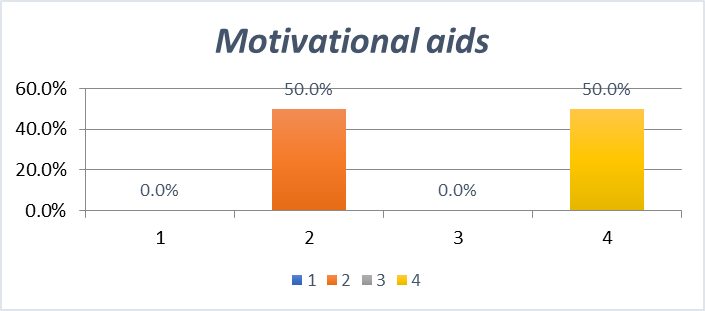
In motivational aids variable, there were 2 items. The results of data analysis, presented in Figure
Resources
Resources consist of human, financial, time, and attention needed for successful implementation of knowledge management. Human resources are required to coordinate and manage the implementation process. Financial support is required in the investment of technology systems. Time and attention are also the important resources for the organization.

In the resources variable, there are 3 items. Based on the results of data analysis, presented in Figure
Training and education
In this study, training and education variable involved 4 items. Based on the results of data analysis, in Figure
Training and education imply that organization must manage knowledge and recognize it as key resources for the survival of the company. In addition, employees should be trained and educated in performing knowledge management systems (Wong, 2005).
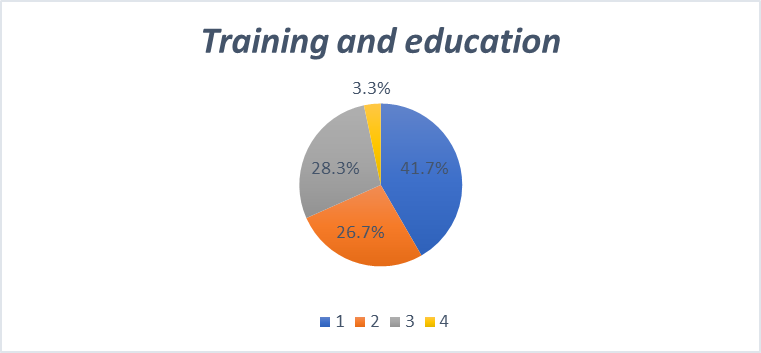
Human resources management
Human resource management refers to the management of recruitment, development, and retention of employees. People are the core of the creation of organizational knowledge (Holsapple & Joshi, 2000), because the people create and share knowledge. Managing people creating and sharing knowledge are the critical process (O’Dell & Grayson, 1999).
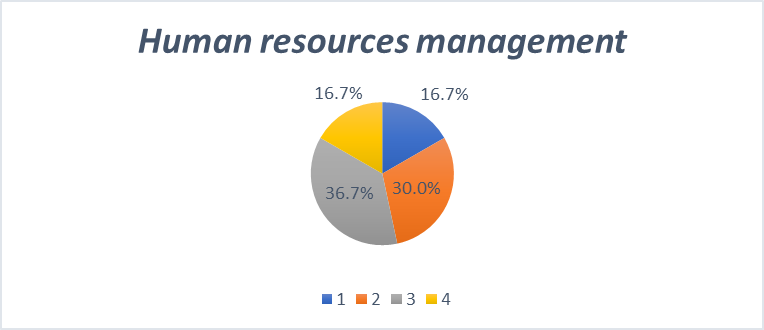
In the variable of human resources management, there were 2 items. Based on the results of data analysis; in Figure
Conclusion
More than 50% of SMEs in Malang do not yet have or only partly utilize supporting factors to support the successful implementation of knowledge management. If sorted from the least or critical factors to the highest one, the factors are as follows, organizational infrastructure; resources; measurement; process & activities. On these factors, more than 70% of SMEs have not yet implemented the factors. For training & education; culture; and strategy factor; around 50% to 70% of SMEs have not yet applied these factors. For the remaining factors consisting of motivational aids; human resources management; management of leadership & support; and information technology, roughly 30% to 50% of SMEs have not yet applied those factors well. For further research, it is necessary to analyze what factors have more influence on the success of knowledge management implementation. The findings of that study can supplement the results of this study to determine the critical factors that should be improved immediately.
Acknowledgments
This study was funded by University of Brawijaya
References
- Alavi, M., & Leidner, D. E. (2001). Knowledge management and knowledge management systems: conceptual foundations and research issues. MIS Quarterly, 25(1), 107-136.
- Arora, R. (2002). Implementing KM – a balanced score card approach. Journal of Knowledge Management, 6(3), 240-249.
- Bender, S., & Fish, A. (2000). The transfer of knowledge and the retention of expertise: a continuing need for global assignments. Journal of Knowledge Management, 4(2), 125-137.
- Bornemann, M., & Sammer, M. (2003). Assessment methodology to prioritize knowledge management related activities to support organizational excellence. Measuring Business Excellence, 7(2), 21-28.
- Clarke, J., & Turner, P. (2004). Global competition and the Australian Biotechnology industry: developing a model of SMEs knowledge management strategies. Knowledge and Process Management, 11(1), 38-46.
- Davenport, T. H., Prusak, L., & Wilson, J. H. (2003). Who’s bringing you hot ideas and how are you responding? Harvard Business Review, 81(2), 59-64.
- Goh, S. C. (2002). Managing effective knowledge transfer: an integrated framework and some practice implications. Journal of Knowledge Management, 6(1), 23-30.
- Grossman, M. (2006). An overview of KM assessment approaches. Journal of American Academy of Business, 8, 242-247.
- Hansen, M. T., Nohria, N., & Tierney, T. (1999). What is your strategy for managing knowledge? Harvard Business Review, 77(2), 106-118.
- Hasanali, F. (2002). Critical success factors of knowledge management. available at http://providersedge.com/docs/km_articles/Critical_Success_Factors_of_KM.pdf (accessed 20 November 2016),
- Hines, P., & Taylor, D. (2000). Going Lean - A Guide for Implementation. Cardiff: Lean Enterprise Research Centre, Cardiff Business School.
- Holsapple, C. W., & Joshi, K. D. (2000). An investigation of factors that influence the management of knowledge in organizations. Journal of Strategic Information Systems, 9(2), 235-261.
- Jennex, M. E., & Zakharova, I. (2005). Knowledge management CSFs. available at: www.management.com.au/strategy/str110.html (accessed October 17).
- Johannssen, C. G. (2000). Total quality management in a KM perspective. Journal of Documentation, 56(1), 42-54.
- Levinson, W. A. (2013). Lean Management System LMS 2012: A framework for continual lean improvement. Boca Raton: CRC Press.
- Liebowitz, J. (1999). Key ingredients to the success of an organization’s KM strategy. Knowledge and Process Management, 6(1), 37-40.
- Long, D. D. (1997). Building the Knowledge-based Organizations: How Culture Drives Knowledge Behaviors. Cambridge, MA: Ernst & Young LLP.
- Maier, R., & Remus, U. (2002). Defining process-oriented KM strategies. Knowledge & Process Management, 9(2), 103.
- Migdadi, M. (2009). Knowledge management enablers and outcomes in the small-and-medium sized enterprises. Industrial Management & Data Systems, 109(6), 840-858.
- Nonaka, I. (1994). The dynamic theory of organizational knowledge creation. Organization Science, 5(1), 14-37.
- O’Dell, C., & Grayson, J. (1999). Knowledge transfer: discover your value proposition. Strategy & Leadership, 21(2), 10-15.
- Poppendieck, M. (Ed.). (2002). Principles Of Lean Thinking: Oopsla Onward.
- Sharp, D. (2003). Knowledge management today: challenges and opportunities. Information Systems Management, 20(2), 32-37.
- Wilhelmij, P., & Schmidt, R. (2000). Where does knowledge management add value. Journal of Intellectual Capital, 1(4), 366-380.
- Wong, K. Y. (2005). Critical success factors for implementing knowledge management in small and medium enterprises. Industrial Management & Data Systems, 105(3), 261-279.
- Yang, L. R., Chen, J. H., & Wang, H. W. (2012). Assessing impacts of information technology on project success through knowledge management practice. Automation in Construction, 22, pp. 182-191.
Copyright information

This work is licensed under a Creative Commons Attribution-NonCommercial-NoDerivatives 4.0 International License.
About this article
Publication Date
31 July 2018
Article Doi
eBook ISBN
978-1-80296-043-3
Publisher
Future Academy
Volume
44
Print ISBN (optional)
-
Edition Number
1st Edition
Pages
1-989
Subjects
Business, innovation, sustainability, environment, green business, environmental issues, industry, industrial studies
Cite this article as:
Sumantri, Y. (2018). Supporting Factors For Knowledge Management Implementation In Small And Medium Enterprises (Smes). In N. Nadiah Ahmad, N. Raida Abd Rahman, E. Esa, F. Hanim Abdul Rauf, & W. Farhah (Eds.), Interdisciplinary Sustainability Perspectives: Engaging Enviromental, Cultural, Economic and Social Concerns, vol 44. European Proceedings of Social and Behavioural Sciences (pp. 550-561). Future Academy. https://doi.org/10.15405/epsbs.2018.07.02.59

